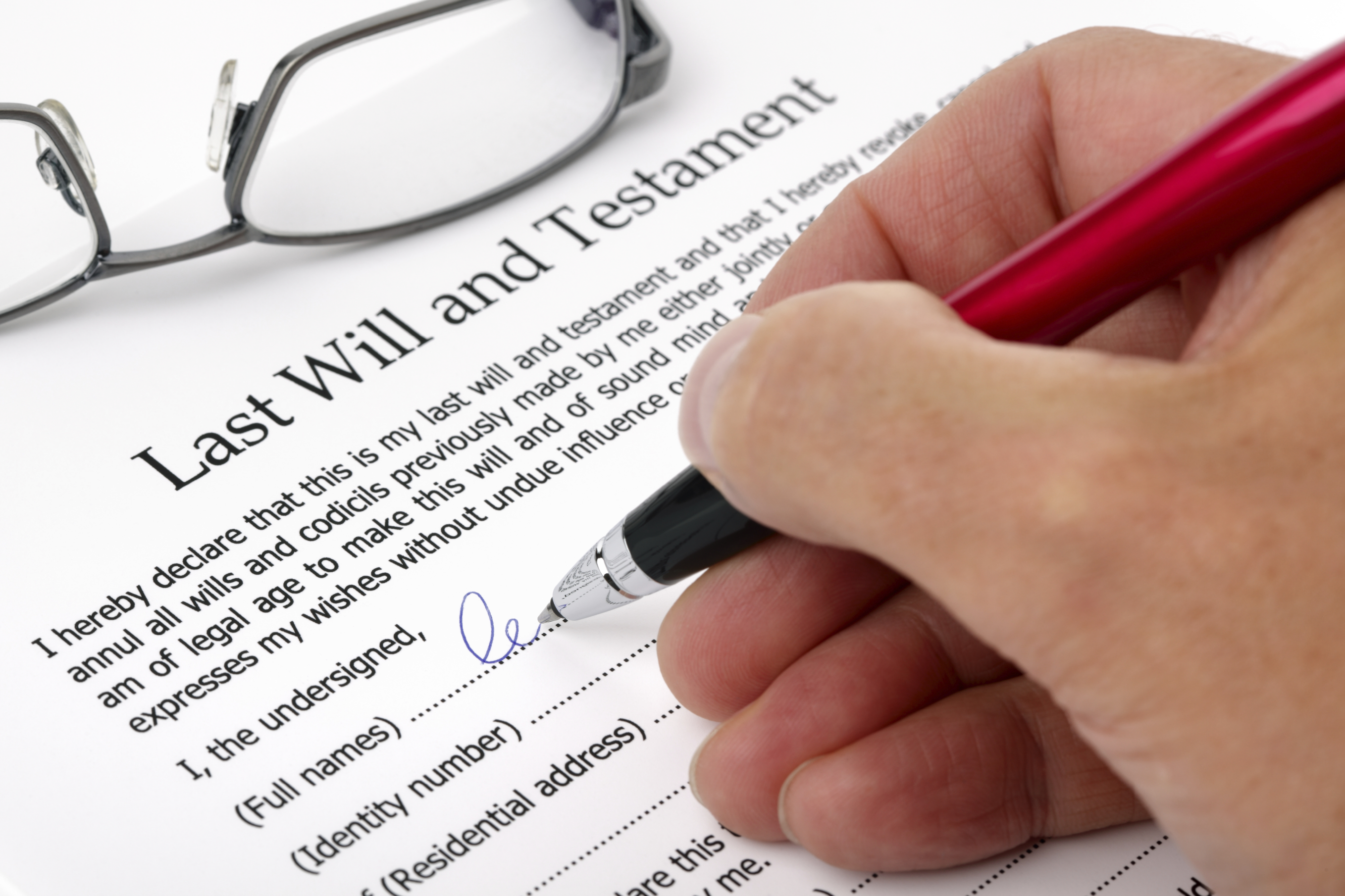|
|
Southern California Estate Planning, Probate, Trust & Litigation Law Blog
Monday, March 28, 2016
 How is the funding handled if you decide to use a living trust? How is the funding handled if you decide to use a living trust?
Certificates represent shares of a company. There are generally two types of company shares: those for a publicly traded company, and those for a privately held company, which is not traded on one of the stock exchanges.
Let's assume you hold the physical share certificates of a publicly held company and the shares are not held in a brokerage account. If, upon your death, you own shares of that company's stock in certificated form, the first step is to have the court appoint an executor of your estate.
Once appointed, the executor would write to the transfer agent for the company, fill out some forms, present copies of the court documents showing their authority to act for your estate, and request that the stock certificates be re-issued to the estate beneficiaries.
There could also be an option to have the stock sold and then add the proceeds to the estate account that later would be divided among the beneficiaries. If the stock is in a privately held company there would still be the need for an executor to be appointed to have authority. However, the executor would then typically contact the secretary or other officers of the company to inquire about the existence of a shareholder agreement that specifies how a transfer is to take place after the death of a shareholder. Depending on the nature of the agreement, the company might reissue the stock in the name(s) of the beneficiaries, buy out the deceased shareholder’s shares (usually at some pre-determined formula) or other mechanism.
If you set up a revocable living trust while you are alive you could request the transfer agent to reissue the stock titled into the name of the trust. However, once you die, the "trustee" would still have to take similar steps to get the stock re-issued to the trust beneficiaries.
If you open a brokerage account with a financial advisor, the advisor could assist you in getting the account in the name of your trust, and the process after death would be easier than if you still held the actual stock certificate.
Monday, March 21, 2016
 Individuals who are beginning the estate planning process may assume it's best to have their adult child(ren) join them in the initial meeting with an estate planning attorney, but this may cause more harm than good. Individuals who are beginning the estate planning process may assume it's best to have their adult child(ren) join them in the initial meeting with an estate planning attorney, but this may cause more harm than good.
This issue comes up often in the estate planning and elder law field, and it's a matter of client confidentiality. The attorney must determine who their client is- the individual looking to draft an estate plan or their adult children- and they owe confidentiality to that particular client.
The client is the person whose interests are most at stake. In this case, it is the parent. The attorney must be certain that they understand your wishes, goals and objectives. Having your child in the meeting could cause a problem if your child is joining in on the conversation, which may make it difficult for the attorney to determine if the wishes are those of your child, or are really your wishes.
Especially when representing elderly clients, there may be concerns that the wishes and desires of a child may be in conflict with the best interests of the parent. For example, in a Medicaid and long-term care estate planning context, the attorney may explain various options and one of those may involve transferring, or gifting, assets to children. The child's interest (purely from a financial aspect) would be to receive this gift. However, that may not be what the parent wants, or feels comfortable with. The parent may be reluctant to express those concerns to the attorney if the child is sitting right next to the parent in the meeting.
Also, the attorney will need to make a determination concerning the client's competency. Attorneys are usually able to assess a client's ability to make decisions during the initial meeting. Having a child in the room may make it more difficult for the attorney to determine competency because the child may be "guiding" the parent and finishing the parents thoughts in an attempt to help.
The American Bar Association has published a pamphlet on these issues titled "Why Am I Left in the Waiting Room?" that may be helpful for you and your child to read prior to meeting with an attorney.
Monday, March 7, 2016

The world of estate planning can be complex. If you have just started your research or are in the process of setting up your estate plan, you’ve likely encountered discussions of wills and trusts. While most people have a very basic understanding of a last will and testament, trusts are often foreign concepts. Two of the most common types of trusts used in estate planning are testamentary trusts and inter vivos trusts.
A testamentary trust refers to a trust that is established after your death from instructions set forth in your will. Because a will only has legal effect upon your death, such a trust has no existence until that time. In other words, at your death your will provides that the trusts be created for your loved ones whether that be a spouse, a child, a grandchild or someone else.
An inter vivos trust, also known as a revocable living trust, is created by you while you are living. It also may provide for ongoing trusts for your loved ones upon your death. One benefit of a revocable trust, versus simply using a will, is that the revocable trust plan may allow your estate to avoid a court-administered probate process upon your death. However, to take advantage this benefit you must "fund" your revocable trust with your assets while you are still living. To do so you would need to retitle most assets such as real estate, bank accounts, brokerage accounts, CDs, and other assets into the name of the trust.
Since one size doesn’t fit all in estate planning, you should contact a qualified estate planning attorney who can assess your goals and family situation, and work with you to devise a personalized strategy that helps to protect your loved ones, wealth and legacy.
Monday, February 29, 2016

While the terms "estate tax" and "inheritance tax" are often used interchangeably, they are not synonymous. Let's try to clarify the difference.
Estate Tax
Estate tax is based on the net value of the deceased owner's property. An estate tax is applied to these assets when they are transferred to the beneficiary. It is important to remember that an estate tax doesn't have anything to do with the beneficiary or that person's resources.
Federal estate tax only affects individuals who die with more than $5.45[s1] million in assets and individuals with such large estates can leave that amount to their beneficiaries without being subjected to a tax liability. Ninety-nine percent of the population will not owe federal estate tax upon their death.
In most circumstances, no federal estate tax is levied against spouses. As of the Supreme Court's recent ruling, this includes gay married couples as well as heterosexual couples. Federal estate taxes can, however, be charged if the spouse who is the beneficiary is not a citizen of the U.S. In such cases, though, a personal estate tax exemption can be used. Even where remaining spouses have no liability for federal estate tax, they may be charged with state taxes in some states, taxes which cannot be avoided unless the couple relocates.
Inheritance Tax
Inheritance tax, as distinguished from estate tax, is imposed by state governments and the tax rate depends on the person receiving the property, and, in some locations, on how much that person receives. Inheritance tax can also vary depending upon the relationship between the testator and the benefactor. In Pennsylvania, for example, a spouse is not taxed at all; a lineal descendant (the child of the deceased) is taxed at 4.5 percent; a sibling is taxed at 12 percent, and anyone else must pay 15 percent.
Exemptions
There are exemptions that can reduce the amount of inheritance tax owed by significant amounts, but it is important that there be proper documentation of such exemptions for them to be applicable. Any part of the inheritance that is donated to charity does not require inheritance tax payment on the part of the beneficiary. Because of the inherent complexities of tax law and the variations from state to state, working with a tax attorney who has expertise with state tax laws s the best way to make sure you take advantage of any possible tax exemptions or avoidance.
Monday, February 22, 2016

In this computer age, when so many tasks are accomplished via the internet -- including banking, shopping, and important business communications -- it may seem logical to turn to the internet when creating a legal document such as a will . Certainly, there are several websites advertising how easy and inexpensive it is to do this. Nonetheless, most of us know that, while the internet can be a wonderful tool, it also contains a tremendous amount of erroneous, misleading, and even dangerous information.
In most cases, as with so many do-it-yourself projects, creating a will most often ends up being a more efficient, less expensive process if you engage the services of a qualified attorney. Just as most of us are not equipped to do our own plumbing repairs or automotive repairs, most of us do not have the background or experience to create our own legal documents, even with the help of written directions.
Situations that Require an Attorney for Will Creation
In certain cases, the need for an estate planning attorney is inarguable. These include situations in which:
- Your estate is large enough to make estate planning guidance necessary
- You want to disinherit your legal spouse
- You have concerns that someone may contest your will
- You worry that someone will claim your mind wasn't sound at the signing
Mistakes and Omissions
It has always been possible to write a will all by yourself, even before the advent of the typewriter, let alone the computer. Such a document, however, is unlikely to deal with the complexities of modern life. Many estate planning attorneys have seen, and often been asked to repair, wills that have mistakes or significant omissions. These experts have also become aware of situations in which the survivors of the deceased wind up in court, spending thousands of dollars to contest ambiguously worded or incomplete wills. Without legal guidance from a competent estate planning attorney, creating a "boxtop" will can result in tremendous financial and emotional risk.
Evidence that Online Wills Are Not Foolproof
Evidence that many other complications can arise when an individual creates a will using generalized online directions can be found in the following facts:
- Each state has its own rules (e.g. requiring differing numbers of disinterested party signatures)
- Even uncontested wills can remain in probate if not executed in an exacting fashion
- Estate planning attorneys find legal software programs inadequate
- Even legal websites themselves recommend bringing in an attorney in all but the very simplest cases
- Some legal websites provide inexpensive monthly legal consultations with attorneys to protect their client and themselves
Areas that Frequently Cause Problems
Self-constructed wills often become problematic when the testator:
- Names an executor who has no financial or legal knowledge
- Leaves a bequest to a pet (legally, you must leave the bequest to an appointed caretaker)
- Puts conditions on payouts to an that are difficult, or impossible, to enforce
- Makes unusual end-of-life decisions or puts living will information into the will
- Designates guardians for children, but neglects to name successor guardians
- Neglects to coordinate beneficiary designations where, for example, the will and insurance policy designations contradict one another
- Leaves funeral instructions into the will since the document will most likely not be read until after the funeral has taken place
- Leaves inexact or ambiguous instructions dealing with blended families
- Neglects to mention small items in the will which, though of small financial value, are meaningful to loved ones and may cause contention
In order to ensure that you leave your assets in the hands of those you wish, and to avoid leaving your loved ones with bitter disputes and expensive probate costs, it is always wise to consult with an experienced estate planning attorney when making a will. In this area, as in so many others, it is best, and safest, to make use of those with expertise in the field.
Monday, February 8, 2016

When someone dies without a will, it is known as dying intestate. In such cases, state law (of the state in which the person resides) governs how the person's estate is administered. In most states, the individual's assets are split -- with one third of the estate going to the spouse and all surviving children splitting the rest. For people who leave behind large estates, unless they have established trusts or other tax avoidance protections, there may be a tremendous tax liability, including both estate and inheritance tax.
For just about everyone, the cost of having a will prepared by a skilled and knowledgeable attorney is negligible when compared to the cost of dying intestate, since there are a number of serious consequences involved in dying without a proper will in place.
Legal Consequences
The larger your estate, the more catastrophic the consequences of dying intestate will be. If you die without a will, the freedom to decide how your property will be divided will be taken from you and the state in which you reside will divide your assets.
Not only will you not be able to decide on the distribution of your property, but a stranger will be making personal, familial decisions. This may be divisive among your family members; instead of leaving your loved ones in peace, you may leave them engaged in bitter disputes over a family heirloom or even a simple memento. This can be especially true in situations where there are children from a previous marriage.
Tax Consequences
In addition to the legal and personal problems associated with dying intestate, the tax results can be severe as well. This is particularly true for clients who have not consulted with an estate planning attorney in order to protect themselves through tax avoidance methods. Both the state and federal governments can tax the transfer of property and an inheritance tax may be imposed on the property you have left to your heirs.
The most effective way to avoid all of these negative tax consequences is to create a will with a competent attorney. Your lawyer will help you to choose a proper executor (the person who will administer your estate, distribute your property and pay your debts), and will assist you in finding ways to limit your tax liability. There are several ways your attorney can help you to do this:
- By gifting some of those you want to inherit before you die
- By creating one or several trusts
- By purchasing a life insurance policy
- By buying investments in your loved one's name
These methods will ensure that your loved ones receive the assets you desire them to have, while simultaneously protecting them from possibly enormous tax burdens after you pass.
For those who have no family, dying without a will can be even more troublesome and costly, since their entire fortunes can be left to the state. If a genealogical search doesn't turn up any blood relatives, all of your assets will be claimed by the government. This means that any individual, group, organization or charity you wished to endow will receive nothing.
It is never easy to think of one's own mortality, but it is even more painful to contemplate leaving a messy, uncomfortable situation behind when you pass. By engaging the services of an excellent estate planning attorney, who will help you fashion a legally binding, precisely designed document, you can make sure that your loved ones are well taken care of and that your final wishes are respected and implemented.
Monday, January 25, 2016

A tax basis is essentially the purchase price of a piece of property. Whenever that property is sold, the seller must pay taxes on the difference between the sale price and the original purchase price. This concept applies to all property, including stocks, bonds, vehicles, mechanical equipment, and real estate. If debts are assumed along with the purchase price, the principal amount of the debt will be included in the basis. The basis can be adjusted downwards when a person deducts depreciation costs on his or her income tax returns, and may be increased for capital investments towards improving the property that are not deducted for income tax purposes. Selling a property that has been held for a long time can carry a serious tax burden because of inflation, particularly when real estate prices have increased.
When an individual receives property as an inheritance, the tax basis is reset to whatever the fair market value is at the time of the transfer of title. This means that the heir would pay significantly less taxes if that property is sold by the beneficiary than if the original owner were to sell it and devise the money to his beneficiaries. Most simple wills provide that all of a testator’s assets are placed into a residual estate to be divided equally among the heirs. This means that an executor must liquidate the assets of the estate and divide the proceeds among the heirs. However, because there is no transfer of title before the property is sold, the heirs are stuck with the grantor’s basis and they lose an opportunity for a sizeable tax break.
A person planning his or her estate may also reset the basis in his or her property by giving it as a gift directly to his or her heirs or by gifting the property to an inter vivos trust. These actions can have their own tax related consequences, or create other unintended problems for the beneficiaries. Only an experienced estate planning attorney can advise you on the most efficient way to pass your assets on to your heirs.
Monday, January 11, 2016

The role of an executor is to effectuate a deceased person’s wishes as declared in a will after he or she has passed on. The executor’s responsibilities include the distribution of assets according to the will, the maintenance of assets until the will is settled, and the paying of estate bills and debts. An old joke says that you should choose an enemy to perform the task because it is such a thankless job, even though the executor may take a percentage of the estate’s assets as a fee. The following issues should be considered when choosing an executor for one's estate.
Competency: The executor of an estate will be going through financial and legal documents and transferring documents from the testator to the beneficiaries. If there are legal proceedings, the executor must make all necessary court appearances. There is no requirement that a testator have any financial or legal training, but familiarity with these areas does avoid the intimidation felt by lay people, and potentially saves money on professional fees.
Trustworthiness: The signature of an executor is equivalent to that of the testator of an estate. The executor has full control over all of an estate’s assets. He or she will be required to go through all of the papers of the deceased to confirm what assets are available to be distributed. The temptation to transfer assets into the executor's own name always exists, particularly when there is a large estate. It is important to choose a person with integrity who will resist this temptation. It makes sense to utilize an individual who is an heir to fill the role to alleviate this concern.
Availability: The work of collecting rents, maintaining property, and paying debts can take more than a few hours a week. Selecting an executor with significant obligations to work or family may cause problems if he or she does not have the time available to devote to the task. If an executor must travel great distances to address issues that arise, there will be more of a time commitment necessary, not to mention greater expenses for the estate.
Family dynamics: Selection of the wrong person to act as executor can create resentment and hostility among an estate’s heirs. A testator should be aware of how family members interact with one another and avoid picking someone who may provoke conflict. Even the perception of impropriety can lead to a lawsuit, which will serve to take money out of the estate’s coffers and delay the legitimate distribution of the estate.
Monday, January 4, 2016

The law allows a person preparing a will to have almost complete control over his or her assets after the testator passes on, but there are limits to such power. A person can restrict a property from being sold, or make sure that it is used for a specific purpose. A property can be bequeathed to a family member as long on condition that the person maintains the family business in a specific city, or exercises daily, or places flowers on the deceased's grave every week, or engages in any other behavior the testator desires. This freedom, however, is not without limits. The time limit on this ability is called the rule against perpetuities. The rule is also referred to as the “dead man’s hand” statute.
The rule against perpetuities is complex and rarely utilized. At the time of the passing of the testator, the heirs of the estate are locked in. These heirs are referred to as “lives in being.” For the purposes of this rule, if a child is conceived but not yet born at the time of the testator’s death, it will be considered a life in being. Once the last living heir named in the will passes away, the restrictions on the property will continue in place as the testator desired for 21 years. The idea is that a testator may control his assets for a full generation after his or her death. The rule is notoriously difficult to apply properly. When it does apply, the conditions on the bequest are abandoned and the gift returns to the residual estate.
What makes this rule so confusing is that, when an individual writes a will, he or she may make gifts to potential children or grandchildren. These children and grandchildren, however, may not be born until years later. If a child has been born at the time the decedent passes away, he or she is subject to the restrictions on the bequest during his or her lifetime. If a grandchild is conceived and born after the decedent’s death, however, the child may avoid the restrictions 21 years after the death of the last heir alive at the time of the decedent’s death. There is no way to predict when this might occur. The rule is archaic and easily avoided. A knowledgeable attorney can help a person planning his or her estate set up an equitable trust. Similar to a will, a trust may impose conditions on the use of assets, but is not subject to the rule against perpetuities. There are other advantages to a trust, but one of the most important is avoiding this unpredictable and confusing rule.
Monday, December 28, 2015
 When a loved one dies, an already difficult experience can be made much more stressful if that loved one held a significant amount of debt. Fortunately, the law addresses how an individual’s debts can be paid after he or she is deceased.
When a person dies, his or her assets are gathered into an estate. Some assets are not included in this process. Assets owned jointly between the deceased and another person pass directly to the other person automatically. If there are liens on the property at that time, they will stay on the property, but no new liens can be placed on the property for debts in the name of the deceased. Similarly, debt jointly in the name of the deceased and another party may continue to be collected from the other party. In community property states, all assets and debts are the joint property of both spouses and pass automatically from one to the other. The community property states are Alaska, Arizona, California, Idaho, Louisiana, Nevada, New Mexico, Texas, Washington, and Wisconsin.
From the pool of assets in the estate, an executor is required to pay all just debts. This means that, before a beneficiary may receive anything, all debts must be satisfied. Property might be sold to create liquidity in order to accomplish this. If there are more debts than there are assets, the estate must sell of as many assets as possible to pay off the creditors. If there is no money in the estate, the creditor can not collect anything. Rather than force people into this tiresome process, many creditors will agree to discharge a debt upon receipt of a copy of a death certificate or obituary. This is particularly true of small, unsecured debts. Life insurance proceeds were never owned by the decedent and should pass to a beneficiary without consequence to the estate. Proceeds of a retirement account may also be exempt from debts.
If creditors continue harassing the beneficiaries of debtors, they may be violating federal regulations under the FDCPA. They can be held accountable by their actions, either by the FTC, the state attorney general, or a private consumer law attorney.
Monday, December 14, 2015

During the estate planning process, your attorney will draft a number of legal documents such as a will, trust and power of attorney which will help you accomplish your goals. While these legal documents are required for effective planning, they may not sufficiently convey your thoughts and wishes to your loved ones in your own words. A letter of instruction is a great compliment to your “formal” estate plan, allowing you to outline your wishes with your own voice.
This letter of instruction is typically written by you, not your attorney. Some attorneys may, however, provide you with forms or other documents that can be helpful in composing your letter of instruction. Whether your call this a "letter of instruction" or something else, such a document is a non-binding document that will be helpful to your family or other loved ones.
There is no set format as to what to include in this document, though there are a number of common themes.
First, you may wish to explain, in your own words, the reasoning for your personal preferences for medical care especially near the end of life. For example, you might explain why you prefer to pass on at home, if that is possible. Although this could be included in a medical power of attorney, learning about these wishes in a personalized letter as opposed to a sterile legal document may give your loved ones greater peace of mind that they are doing the right thing when they are charged with making decisions on your behalf. You might also detail your preferences regarding a funeral, burial or cremation. These letters often include a list of friends to contact upon your death and may even have an outline of your own obituary.
You may also want to make note of the following in your letter to your loved ones:
- an updated list of your financial accounts with account numbers;
- a list of online accounts with passwords;
- a list of important legal documents and where to find them;
- a list of your life insurance and where the actual policies are located;
- where you have any safe deposit boxes and the location of any keys;
- where all car titles are located; the
- names of your CPA, attorney, banker, insurance advisor and financial advisor;
- your birth certificate, marriage license and military discharge papers;
- your social security number and card;
- any divorce papers; copies of real estate deeds and mortgages;
- names, addresses, and phone numbers of all children, grandchildren, or other named beneficiaries.
In drafting your letter, you simply need to think about what information might be important to those that would be in charge of your affairs upon your death. This document should be consistent with your legal documents and updated from time to time.
Law Offices of Mary P. Kulvinskas located in Westlake Village, CA serves clients in southern CA including Agoura, Calabasas, Camarillo, Los Angeles, Malibu, Oxnard, Simi Valley, Thousand Oaks, San Fernando Valley, and Ventura.
|
|
 |
|